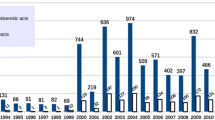Abstract
In the immediate aftermath of the horrifying terrorist attacks on the offices of Charlie Hebdo and the kosher supermarket in Paris in January 2015, one question seemed to run through much of the discourse within Jewish communal circles on the other side of the English Channel: could the same thing happen in the UK? Could the type of targeted antisemitic Islamist attack that took the lives of four Jews that day also occur in the United Kingdom, a country long known for its high levels of tolerance for minorities, low levels of antisemitism, and, in European terms at least, vibrant Jewish life?
Access this chapter
Tax calculation will be finalised at checkout
Purchases are for personal use only
Similar content being viewed by others
Notes
- 1.
The study was supported by colleagues in the United Kingdom at the CST, Dr. Dave Rich and Mark Gardner, alongside Danny Stone and Amy Wagner at the Antisemitism Policy Trust. The project was financed by the CST, the UK government, and a range of individual donors.
- 2.
Interestingly, there is a noticeably more significant modal effect when measuring attitudes towards Muslims online and face-to-face; online respondents are considerably more antipathetic than face-to-face ones.
- 3.
- 4.
It is worth noting that the study also deliberately tested two positive statements about Jews: “A British Jew is just as British as any other British person” and “British Jews make a positive contribution to British society.” A common error in this type of attitudinal research about antisemitism is to measure negative views exclusively as, in a significant number of cases, people’s views are complex and multifaceted, combining both positive and negative opinions.
- 5.
As with the statements about Jews, and for the same reasons elucidated previously, we also included some parallel positive statements about Israel: “The State of Israel has every right to exist”; “The State of Israel is the historic homeland of the Jewish People”; “The State of Israel makes a positive contribution to global society”; and “Israel is the only real democracy in the Middle East.”
- 6.
References
Boyd, J., & Staetsky, L. D. (2015). Could it happen here? What existing data tell us about contemporary antisemitism in the UK. Institute for Jewish Policy Research.
Finkelstein, N. (2005). Beyond Chutzpah: On the misuse of antisemitism and the abuse of history. University of California Press.
Goldhagen, D. J. (2013). The devil that never dies: The rise and threat of global antisemitism. Little, Brown and Company.
Graham, D., & Boyd, J. (2019). The apartheid contention and calls for a Boycott. Examining hostility towards Israel in Great Britain. Institute for Jewish Policy Research.
Jikeli, G. (2015). European Muslim antisemitism: Why young urban males say they don’t like Jews. Indiana University Press.
Klug, B. (2004, February 2). The myth of the new antisemitism, The Nation.
Reynié, D. (2014). Antisemitic attitudes in France: New insights. Fondation pour l’Innovation Politique & the American Jewish Committee.
Staetsky, L. D. (2017). Antisemitism in Great Britain: A study of attitudes towards Jews and Israel. Institute for Jewish Policy Research.
Wistrich, R. S. (2010). A lethal obsession: Antisemitism from antiquity to the global Jihad. Random House.
Author information
Authors and Affiliations
Corresponding author
Editor information
Editors and Affiliations
Rights and permissions
Copyright information
© 2022 Springer Nature Switzerland AG
About this chapter
Cite this chapter
Boyd, J. (2022). Is Anti-Israelism Antisemitism? Evidence from the Institute for Jewish Policy Research Survey of Attitudes Towards Jews Among the Population of Great Britain. In: Kenedy, R.A., Rebhun, U., Ehrlich, C.S. (eds) Israel and the Diaspora: Jewish Connectivity in a Changing World. Studies of Jews in Society, vol 3. Springer, Cham. https://doi.org/10.1007/978-3-030-80872-3_12
Download citation
DOI: https://doi.org/10.1007/978-3-030-80872-3_12
Published:
Publisher Name: Springer, Cham
Print ISBN: 978-3-030-80871-6
Online ISBN: 978-3-030-80872-3
eBook Packages: Religion and PhilosophyPhilosophy and Religion (R0)



